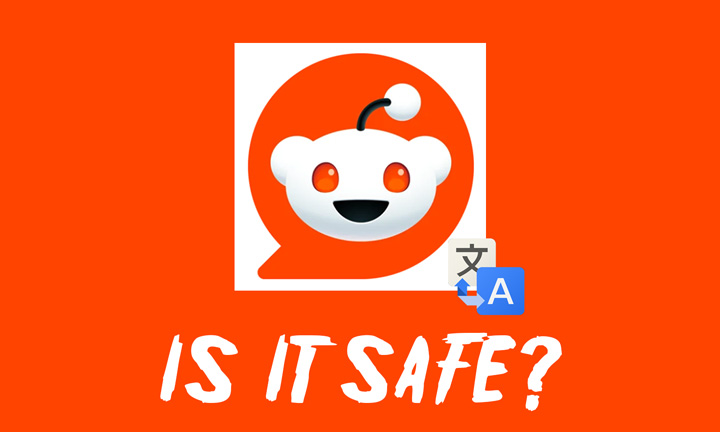
Update: June 11, 2025
Google finally sent me a statement after I asked if they sanctioned the Reddit AI translation situation. I also asked if it was ok now to use AI translations since Reddit was heavily doing that across countries. They have published tens of millions of urls with AI-translated content.
Like I originally covered in my post, Google’s ‘Scaled content abuse’ spam policy does NOT specifically say that AI-translated content is spam. If you leverage AI to translate high-quality and helpful content, then it’s ok. The spam policy is more about scaling content with little or no value to users, content that’s produced to manipulate search engines, etc. Google also said that they don’t provide individualized support for any site. So I guess they did not specifically sanction the use of AI translations for Reddit.
Here is the statement I received from Google about the situation:
“While we don’t comment on the status of specific sites or pages, nor do we provide individualized support for any site, our policies do not strictly define content that has been translated by AI as spam. Our scaled content abuse policy mentions automated transformations, including translations, as part of the overall warning against creating large amounts of unoriginal content that provides little to no value to users.”
In addition, Google is removing information about blocking auto-translated content from their documentation about managing multilingual sites. I had a feeling they would do that. I think that was just overlooked…
Moving forward, site owners must be objective about the quality of their content before pulling the trigger and deciding to translate mass amounts of content. If the content is not high quality, not helpful, etc., and a site owner scales AI translations of that content, then the site could risk getting hit by a spam update or even receive a manual action for ‘Scaled content abuse’. Beware.
You can read the original post below if you’re not familiar with the Reddit AI translation situation.
—————
In a previous post, I explained how Reddit was heavily using AI translated content, it is indexable by Google, and how that content was surging like crazy in the search results. Note, Reddit has been very transparent about their use of machine translation over time and how it’s being used across a number of languages now.
And Beyond Reddit, I also explained how using machine translation in the past has historically been a very risky thing for site owners to do from a Google standpoint. For example, I’ve had sites reach out after getting a manual action or smoked during a spam update based on scaling via machine translation (which could also use AI for translating content).
So, after Reddit added tens of millions of AI-translated urls to the site, I was eager to see what Google would do about it. That’s a ton of AI-translated content… Surely there would be some action taken by Google, right? I’m seeing millions of AI-translated urls per country (for some countries).
For example, I see 2.3M urls ranking in France with AI-translated content:
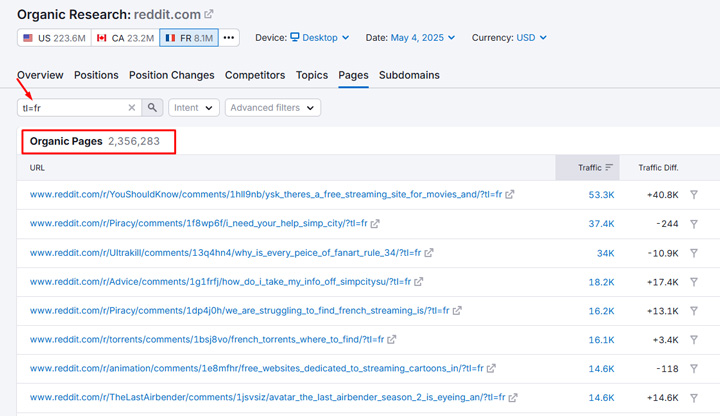
And I see 2.4M urls ranking in Spain with AI-translated content:
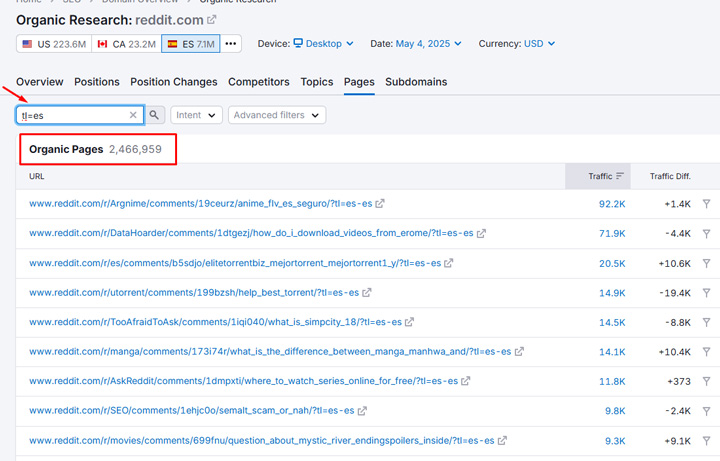
And keep in mind, I’ve seen content translated into over 20 different languages based on checking hreflang tags for Reddit’s content. Needless to say, this is using AI-translations at massive scale…
So, wouldn’t this fall under “Scaled content abuse”?? And maybe a worse situation, would Google take algorithmic action against Reddit via a spam update? Again, I’ve had companies reach out to me after seeing that happen. It’s not pretty. More about manual actions and spam updates later in this article.
Is it safe? {with dentist drill blaring in the background…}
Ever since writing my original post, I’ve had site owners reach out to see if they too can use AI-translated content to scale to other languages. If Reddit could do it, could they too? By the way, I’m referring to some large-scale sites with a footprint of 50-100M urls each. So their decision is an important one that comes with a lot of risk. I’ll provide a site owner’s guide at the end of the post in case you are also in this situation.
The question reminds me of the incredibly tense scene in Marathon Man when Dustin Hoffman is being interrogated by the villain. Hoffman’s character really doesn’t know if it’s safe, but the villain has a very successful way of getting the information he wants. Let’s just say a fresh cavity and drill are involved… Well, site owners asking me if it was safe weren’t that aggressive, but I sort of felt like Dustin Hoffman for a bit. :)

So it’s a big decision, and one that could potentially cause big problems, if Google viewed their situation differently than Reddit’s AI-translated content. Again, that could be in the form of a manual action or a spam update hit. And neither are fun to have, especially the spam update hit (since it can take months after cleanup to see recovery – if the site recovers at all).
Google’s reaction, or lack thereof:
So how did Google respond to Reddit’s massive scaling via AI-translated content? Well, nothing happened. Nothing at all. Actually, all of that AI-translated content continues to surge across countries. And to add insult to injury, Reddit is doubling down on machine translation.
They covered this during their latest quarterly earnings results. They explained that even more languages are rolling out, and that their intention is to also have that content rank in Search. They have explained the Search piece before by the way, so it’s not like the translations are just for on-site users. They want people finding the AI-translated content ranking in Google. And rank it does.
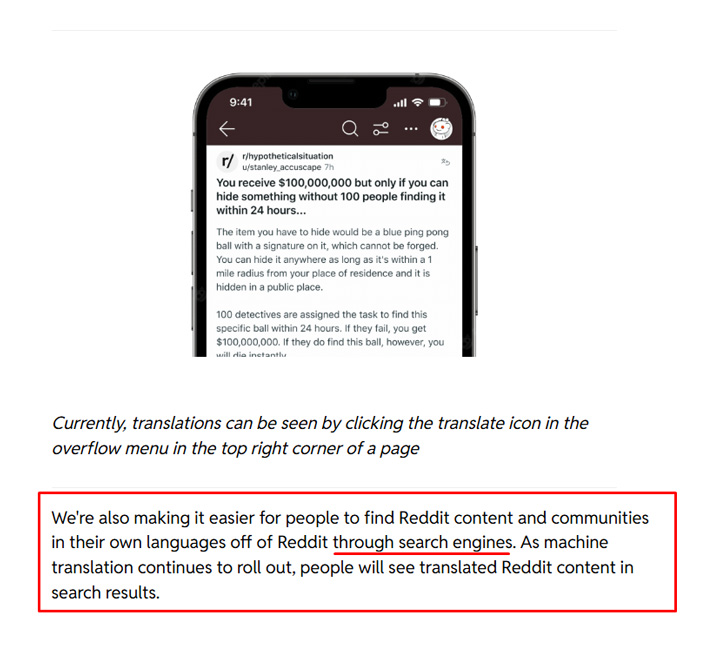
And beyond that blog post, Reddit HEAVILY covered machine translation on its earnings call. They covered how they are expanding AI-translated content, on how it’s driving visibility growth for them, and even how Google is helping them with the project. Yes, they literally approached Google (I’m assuming based on their partnership) to ask if scaling via AI-translations would be ok. Google presumably said it’s fine and is helping them do that via Gemini. Reddit even said, “it’s totally sanctioned (by Google)”… Wow, you can listen to that part in the video below (at 37:38 in the video).
No comment from Google and taking a new journey in the “Gabeback Machine”:
Note, I reached out to Google for a comment about all of this after publishing my original post, but I don’t have anything official to share unfortunately. That said, I decided to take a closer look at Google’s newish “Scaled content abuse” spam policy. Maybe I was missing something that could give us a clue about why Google seems ok with Reddit using machine translation at scale.
And I also fired up the “Gabeback Machine” to see all the times I have documented what Google has explained about using machine translation to scale. Again, Google was NOT ok with auto-translating content for a long time. But to be honest, it’s more nuanced than a statement like that. Stick with me… this will all come together. :)
Below, I’ll cover both the “Scaled content abuse” spam policy and then what the “Gabeback Machine” yielded as I journeyed back in time. My hope is that this information can help site owners choose the safest path forward when it comes to AI-translated content (or machine translation in general).
Taking a closer look at “Scaled content abuse”. Is scaling via AI translations ok?
I’ll cover the history of Google’s view of auto-translating content soon, but let’s start with the spam policy that’s currently in place. Google announced the “Scaled content abuse” spam policy in March 2024 right when the March 2024 core update rolled out. In the policy, they specifically mention automated translations as something that could violate the policy. Notice I emphasized “could”.
Here is the second bullet from the policy:
“Scraping feeds, search results, or other content to generate many pages (including through automated transformations like synonymizing, translating, or other obfuscation techniques), where little value is provided to user.” So it’s not just about auto-translating content. It’s about doing that where little value is provided to the user.
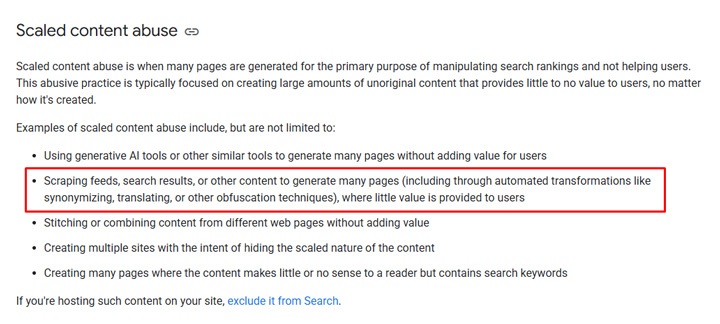
In addition, the policy starts off by explaining that scaled content abuse is when many pages are generated for the primary purpose of manipulating search rankings and not helping users. That’s super important to understand. If you have high-quality and valuable content that you are scaling to help users, then that would not fall under “Scaled content abuse”.
That said, “high quality” and “valuable” is nuanced, and site owners don’t always have a good feel for this when they are reviewing their own content. I’ll come back to this soon when I provide recommendations for site owners.
The next part of the policy says that “Scaled content abuse” is typically about creating large amounts of unoriginal content that provides little to no value to users, no matter how it’s created.
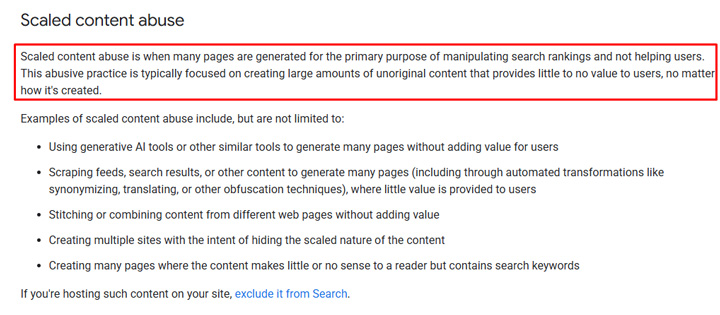
Again, it seems like Google is saying that a site owner with large amounts of original and valuable content CAN scale that content and it wouldn’t fall under “Scaled content abuse.” Again, it’s nuanced since it’s often hard to evaluate your own content. I’ll cover more about that soon.
And I wanted to mention the first bullet in the policy as well. It’s not about translations, but it is about using AI-generated content. Google explains that using AI tools to generate many pages without adding value for users would violate the spam policy. So again, if a site owner has many helpful and valuable pages that they want to translate via AI, maybe that doesn’t fit under the spam policy.
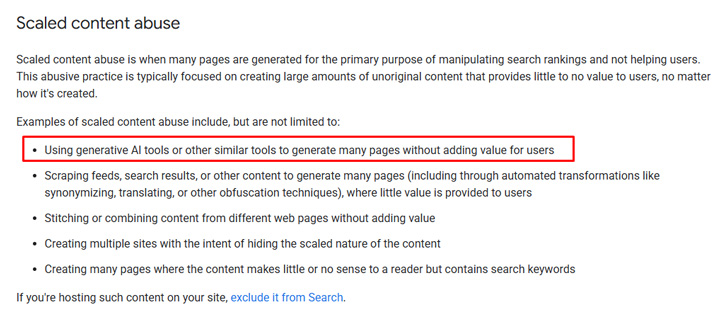
As you can see, the spam policy is more nuanced than most people think. And Google’s stance has also evolved over time with regard to auto-translating content (using machine translation – via AI or not).
On that note, below I’ll quickly cover my travels via the “Gabeback Machine” when researching Google’s stance on using machine translation (or AI-translated content). Then I’ll provide a bulleted list of recommendations for site owners that are thinking about following Reddit’s lead with AI-translated content.
Google’s evolving stance on using machine translation. Traveling through time via the “Gabeback Machine” to uncover past communications.
Google has a long history of addressing auto-translated content and their stance has evolved over time. After firing up the “Gabeback Machine”, I uncovered a number of shares of mine from the past, which obviously led to a number of articles on Search Engine Roundtable. Google’s comments date back to Matt Cutts, with more comments from John Mueller over time.
Below are a few quotes and examples that demonstrate Google’s stance over time. This is also why it’s important to take a very close look at your content, and from an outsider’s perspective, BEFORE choosing to scale via auto-translation.
First, up is John Mueller from 2010 explaining that using auto-translations via Google Translate can be against Google’s guidelines. He issued a warning to a site owner about just taking an auto-translated piece of content and publishing it on their site.

Next up is Matt Cutts from 2011 also explaining that Google Translate usage could be seen as spam. Matt published a YouTube video explaining that Google’s guidelines that apply to “auto-generated stuff can also apply to auto-translated text.” Matt emphasized that humans should be involved with editing the content and making sure it makes sense for users.
Traveling ahead via the “Gabeback Machine”, John Mueller in 2018 covered auto-translated spam again. But he did explain there’s a difference between site owners intending to spam the search results versus legitimate uses of translating content to get that information out to a wider international audience. Intent matters, which matches what the current “Scaled content abuse” spam policy explains.
From John: “So that’s something where I wouldn’t necessarily say that using translated content like that would be completely problematic but it’s more a matter of the intent and kind of the bigger picture (about) what they’re doing. If they’re essentially just spinning content and hoping that it ranks, then that that would be more of a problem for us.”
And zooming ahead to 2023 when Gizmodo started auto-translating articles to Spanish on their es.gizmodo.com subdomain. Gizmodo was taking their articles published in English and auto translating the content to Spanish via AI. But it’s important to understand the original articles were legitimate articles written by their editors and writers. So this wouldn’t fall under “Scaled content abuse” based on the current spam policy.
As of today, I see about 7K articles with that label indexed. And that’s out of 115K total indexed on the subdomain (about 6% of indexed content on the subdomain). So it’s not a huge amount of articles that have been translated either.
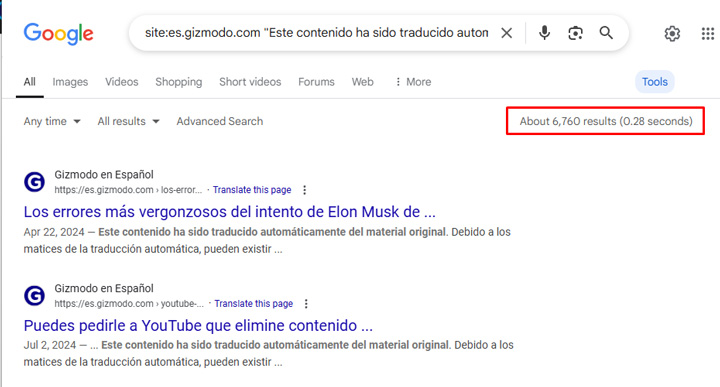
And when checking search visibility for the subdomain, it’s surging recently. Here is Semrush visibility for Spain and Mexico for the es subdomain of Gizmodo. So Google seems to be ok with the use of AI-translated content on Gizmodo as well. And again, this makes sense based on what Google has explained in its “Scaled content abuse” spam policy.
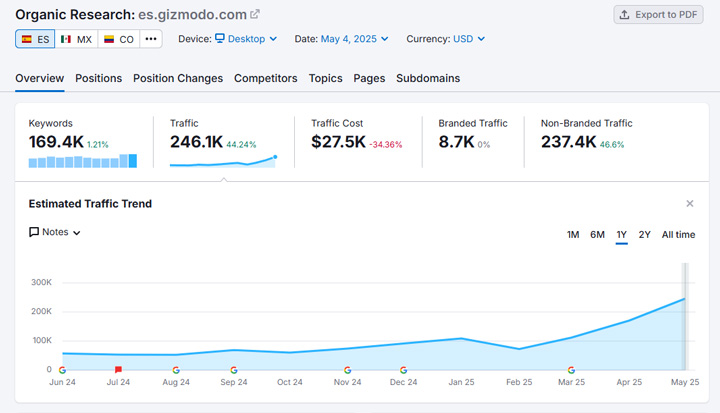
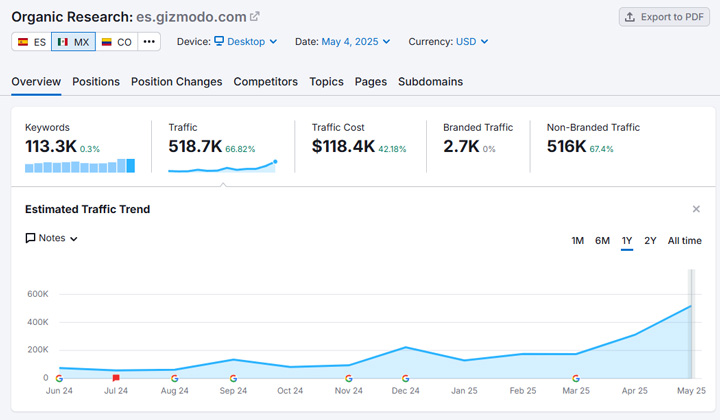
So, is it safe? A cautionary guide for site owners navigating AI-translated content (or machine translation in general):
- First, it’s important to understand there is no clear answer about this. I’ll cover more about objectively reviewing your own content for quality and value soon, but that’s what it comes down to in my opinion. And I believe Google feels the same way based on how the “Scaled content abuse” spam policy was crafted. Therefore, I can’t possibly tell you via this post if it’s safe for you to scale via AI-translated content without having in-depth knowledge of your content, your site, how you created your content, and more.
- Second, remember that Google’s “Scaled content abuse” spam policy specifically states that abuse is when many pages are generated for the primary purpose of manipulating search rankings and not helping users. It’s not about scaling high-quality and valuable content to other languages. This is probably why Reddit has avoided a manual action (or spam update hit).
- Next, the “Scaled content abuse” spam policy specifically mentions auto-translating content and says it’s about generating many pages where little value is provided to users. So again, it’s not about high-quality and valuable content when it comes to machine translation. It’s about low-quality content being scaled…
- And regarding AI-generated content, the “Scaled content abuse” policy also mentions that using generative AI tools to generate many pages without adding value for user would violate the policy. They are not saying all AI-generated translations would.
- Next, Reddit explained in its quarterly earning call that they approached Google to see if it was ok to use AI-translated content to scale internationally. Google said it was ok and is even helping them via Gemini. Reddit even said, “it’s totally sanctioned (by Google”… That’s super-interesting and I’m assuming this collaboration is based on their official partnership.
- That said, if you are thinking about following Reddit and auto translating your content via AI, then you still need to make sure you will not run afoul of Google’s “Scaled content abuse” spam policy. Make sure you decide to scale high-quality and valuable content and NOT low-quality or thin content. And yes, you might be too close to your own content to evaluate “quality”. I highly recommend running user studies to gauge what real people think about your content BEFORE pulling the trigger and auto translating your content via AI. I would aim to get a group of unbiased, third-party users to review your content so you can better understand if it’s truly high quality and helpful.
- Next, DO NOT simply scale AI-generated content to other languages. If you are pumping out a ton of AI-generated content in one language via some tool and then choosing to scale that content via AI-translations, then I think you are going to run into serious trouble with Google. That might be via a manual action for “Scaled content abuse” or via a future spam update (which is algorithmic). So again, make sure your core content that you choose to scale is high quality and helpful.
- And finally, before moving forward with any auto-translating strategy, make sure you understand the difference between manual actions and spam updates. Manual actions are applied by the webspam team at Google (via humans). You will have the opportunity to address those problems and file reconsideration requests via Google Search Console. At that point, you can go back and forth with the webspam team to better understand what the core problems are and why you received a manual action (and you can make your case if you feel the webspam team was wrong). That’s very different from spam updates, which are algorithm updates rolled out from time to time to address loopholes in the search results. For example, you can read my post about the December 2024 spam update (which was a big spam update that impacted a number of sites across the web). If you are impacted by a spam update, you will need to significantly improve the situation before recovery is possible. But recovery can take months, or longer, since Google will need to see your spam situation greatly improved over the long term. And by the way, there is no guarantee that you ever recover from a spam update. BEWARE.
Summary: Be very careful with your approach to using machine translation (and AI-translations).
So there you have it. Reddit is surging with AI-translated content and Google hasn’t taken action (and maybe for good reason based on their current “Scaled content abuse” spam policy). I’ve received a lot of questions from site owners looking to follow Reddit’s lead with mass-translating their content into other languages via AI. It’s a murky topic since it relies on site owners accurately and objectively evaluating their own “quality” levels. And in my experience helping many sites over the years with recovery from broad core updates, I don’t think many can objectively do that. Many are just too close to their own content.
Therefore, if you want to scale via AI-translations, then definitely seek assistance from objective third-party users. Then heavily review their feedback before taking action and scaling via AI translations. And that’s especially the case if you are planning to auto-translate a lot of content (like thousands, tens of thousands, or millions of urls).
Good luck.
GG



